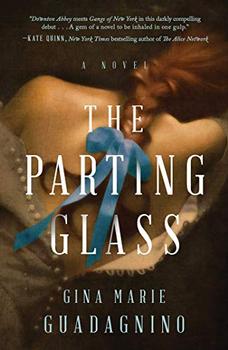Book Club Discussion Questions
In a book club? Subscribe to our Book Club Newsletter!
Please be aware that this discussion guide will contain spoilers!
- How does the opening line, "It was Thursday again, and once more I was courting misery with both arms wide open (1)" set up the tone and voice of the novel?
- Guadagnino starts each chapter with a quote from The Duties of a Lady's Maid. What function do these lessons serve while reading? Do you see the remnants of any of the lessons in today's society?
- One lesson from The Duties of a Lady's Maid is, "Desire nothing but what is within your reach; for if your desires are unreasonable, you may be certain of disappointments (28)." Another says, "If you wish to be happy, avoid all such tales of love and adventure, for they will only fill your fancy with vain images, and make you hopelessly wish for miraculous events that can never happen (93)." How does this theme play out in various ways throughout the novel?
- At the beginning of the novel, Maire longs desperately for Charlotte. "At night, I would lie in my bed and replay all things we had said to each other that day—and did she think me clever, or good (32)?" What did you think about her unrequited love? Have you ever experienced a love like this, and did Guadagnino do a good job capturing that feeling?
- As Maire despairs over Charlotte, we meet Liddie Lawrence, a queer, black-identifying prostitute with a taste for Shakespeare and dreams of owning her own brothel. How did you interpret this character? In what ways did she resonate with you? What role did she play in the novel?
- "I must here remark that I have always thought that anyone laboring under the delusion that women are the weaker sex is unfamiliar with the field of battle that is a society ballroom. For the ballroom is not the place of leisure and frivolity it purports to be. The music is there, I've always felt, the drown out the drums of war (61)." What do you think Maire means by this? Do you believe this sentiment or think it applies to our culture today? Who creates the battlegrounds of men?
- Maire reflects on the way that women of high society are expected to cultivate only those skills that are deemed necessary to attract a husband. "I have always thought it was the most bitter injustice that gentlemen of means are encouraged to develop those talents in which they show promise, for these accomplishments are but an ornament to their attractions to society, while a young lady of means diminishes her worth when she seeks to cultivate a particular talent (87)." What is one way you see this happening today?
- At one point, Maire asks Liddie why she ever went back to "stargazing," and Liddie chastises her for assuming she isn't doing exactly what she likes: "That's queer. I never did peg you for the sort that objected to a woman's pleasure, seeing as you've no qualms about taking your own (99)." Why is Liddie so offended and Maire ultimately ashamed of this question? Did Liddie's explanation of why she "stargazes" alter your perspective at all?
- What would you have done in Maire's situation, knowing Charlotte was pregnant with her brother's child? Do you understand why she didn't tell her brother?
- When Maire and Seanin arrive in New York, Dermot advises them to change their names and "keep the country out of your voice as best you can (130)." How did their story illuminate the plight of Irish immigrants in the 19th century?
- Were you shocked by Liddie's revelations about Johnny, his "protection," and her experience of extortion and abuse at the hands of his men?
- Discuss the relationship between Maire and Seanin. If you have siblings, did you find it relatable?
- As Maire watches the young maids staring at potential suitors, she thinks, "What must it be like to wear one's want and need so baldly on one's face, advertising one's intentions for all to see—indeed, hoping for it to be seen, and recognized, and returned. I was too used to schooling my features to blush or become otherwise moved by such a thought (218)." Compared to Maire, these women are allowed to plainly show their desires because they are socially acceptable desires. Thinking again about the lessons from Duties of a Lady's Maid, can desire be a privilege?
- Maire's father told her that "there are moments in your life that show you who and what you are, and those moments, however rarely they may come, define your character and the course of your history (226)." Do you believe this to be true? Have you ever had one of those moments? What did it tell you about yourself?
- What did you think of the ending?!
Enhance Your Book Club
- Next month, read Sarah Water's Fingersmith or Emma Donoghue's Slammerkin. Compare and contrast with The Parting Glass.
- Do some research on the 1836 attack on Old Saint Patrick's Cathedral and Ancient Order of the Hibernians (an organization that exists to this day.) What else do you learn about the plight of Irish Catholics at this point in American history?
- Read the book or watch the movie Brooklyn (by Colm Toibin), and discuss its connections to this novel.
- If you can, visit or take a tour of New York City's Washington Square Park to bring the novel's setting to life.
Unless otherwise stated, this discussion guide is reprinted with the permission of Atria Books.
Any page references refer to a USA edition of the book, usually the trade paperback version, and may vary in other editions.
